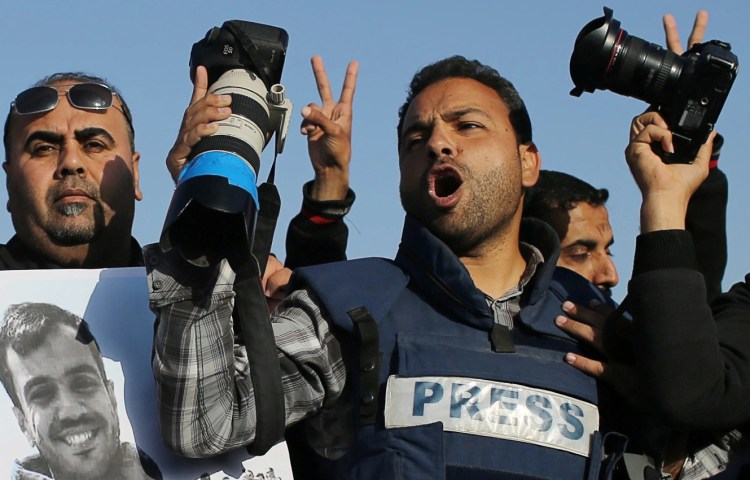
How Israel probes journalist killings
Israel’s procedure for examining military killings of civilians such as journalists is a black box. There is no policy document describing the process in detail and the results of any probe are confidential. If an incident taking place during active combat raises the suspicion of a violation of international law, the office of the army…
Attacks on the Press 2006: Israel and the Occupied Palestinian Territory
ISRAEL and the OCCUPIED PALESTINIAN TERRITORY Israeli troops and armor re-entered the Gaza Strip in late June to stop Palestinians from firing crudely made rockets from the north into Israeli towns along the border. Nearly 370 Palestinians, half of them civilians, were killed in the ensuing six-month Israeli offensive, which intensified after the seizure of…
UK court rules IDF shooting of filmmaker in Gaza was murder
New York, April 5, 2006—The Committee to Protect Journalists today renewed its call for Israel to properly investigate the killing of a British cameraman in the Gaza Strip after a London court found that his shooting by an Israeli officer was murder. James Miller, an award-winning filmmaker, was filming a documentary about Palestinian children caught…
Attacks on the Press 2005: Israel and the Occupied Palestinian Territory
ISRAEL and the OCCUPIED PALESTINIAN TERRITORY In August, Israel facilitated access to hundreds of foreign journalists to witness its withdrawal from the Gaza Strip, even providing shuttle buses to the Jewish settlements that were being dismantled. Such cooperation with the press by the Israel Defense Forces (IDF) was rare the rest of the year. Journalists…

Army to take no action against officer in journalist’s death
New York, April 14, 2005—The Israel Defense Forces said today that it would not take disciplinary action against an officer thought responsible for the May 2003 shooting death of British freelance cameraman and film director James Miller in the Gaza Strip. The Committee to Protect Journalists is deeply disturbed by the decision, which comes one…
Attacks on the Press 2004: Israel and the Palestinian Authority Territories
Israel and the Occupied Territories, including the Palestinian Authority TerritoriesWith Iraq dominating media security concerns in the Middle East, journalists covering the region’s other main flash point quietly faced a familiar array of hazards on the job. The occupied West Bank and Gaza Strip remained two of the most dangerous and unpredictable assignments for journalists…

No criminal charges against IDF soldier in journalist’s shooting death
New York, March 9, 2005—Israel’s army said today that it would not press criminal charges against a soldier thought responsible for the May 2003 shooting death of British freelance cameraman and film director James Miller in the Gaza Strip. In Tel Aviv, Brig. Gen. Avichai Mandelblith told members of Miller’s family that the soldier would…
Attacks on the Press 2003: Middle East and North Africa Analysis
War and political violence drew hundreds of journalists to the Middle East in 2003 for what proved to be a series of relentlessly dangerous assignments. The U.S.-led war in Iraq was one of the most heavily covered conflicts in modern history–and one of the deadliest for journalists. Thirteen reporters died from hostile acts, both during…
Attacks on the Press 2003: Israel and the Occupied Territories
The Israeli army continued to imperil reporters and restrict their work in the occupied West Bank and Gaza Strip, making the area one of the most complicated and dangerous assignments for journalists in the Middle East. During 2003, two journalists were shot and killed by Israel Defense Forces (IDF) fire. Others encountered harsh treatment at…
CPJ requests information on status of investigation into journalists’ deaths
Dear Lieutenant General Yaalon: The Committee to Protect Journalists (CPJ) is writing to request information about the status of the Israel Defense Forces’ (IDF) investigations into the shooting deaths of two journalists in the West Bank and Gaza Strip in 2003, and to reiterate our call for a thorough inquiry into these deaths.